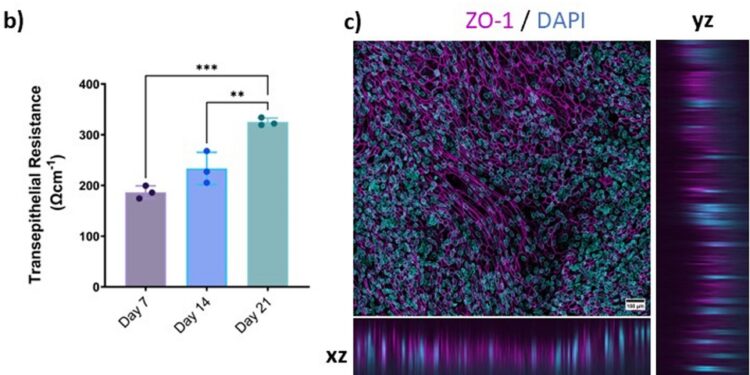Characterization of human primary olfactory mucosal cells at the air-liquid interface. Credit: Journal of Neuroinflammation (2023). DOI: 10.1186/s12974-023-02979-4
A new study identifies alterations in transcriptomic signatures in human olfactory mucosa cells from individuals with Alzheimer’s disease after SARS-CoV-2 infection, potentially contributing to worsening outcomes of COVID-19. The study was carried out at the University of Eastern Finland in collaboration with the University of Helsinki and published in Journal of Neuroinflammation.
The study was prompted by concerns about the impact of COVID-19 on people with pre-existing conditions such as Alzheimer’s disease (AD). Olfactory dysfunction, characterized by an impaired sense of smell, is commonly associated with COVID-19 and is also seen in people with AD.
By exploring the olfactory mucosa as a direct interface between the external environment and the brain, the research aimed to study the interaction between SARS-CoV-2 infection and AD within the olfactory mucosa, by evaluating the potential of this tissue to serve as a plausible route of entry. for the virus in the brain.
Using an innovative in vitro 3D model of the olfactory mucosa, the study used primary cells obtained from volunteer donors, including both cognitively healthy individuals and those diagnosed with AD. These cells were cultured at air-liquid interface (ALI), a technique providing a controlled environment that closely mimics physiological conditions.
The collection of olfactory mucosal biopsies was carried out in collaboration with Kuopio University Hospital. This multidisciplinary research integrated expertise from molecular and cellular biology, neurology and virology to study the effects of various SARS-CoV-2 variants on the olfactory mucosa.
Distinct immune responses after infection between AD patients and healthy individuals
Contrary to expectations, cells derived from healthy individuals and those with AD showed comparable susceptibility to SARS-CoV-2 virus infection, indicating no significant difference in infection rates initial between the two groups.
However, a significant contrast emerged in the genetic activity of infected cells from individuals with AD. Their cells exhibited increased oxidative stress, impaired immune responses, and substantial changes in olfaction-related genes compared to cells in the olfactory mucosa of cognitively healthy individuals.
“The results suggest a plausible scenario in which people affected by AD could face potentially more serious consequences of COVID-19 due to pre-existing inflammation of the olfactory mucosa,” explains Ali Shahbaz, a doctoral student in the group of research by Professor Katja Kanninen at the University of Eastern Finland and first author of the study.
The present study represents a crucial advance in understanding the complex interaction between COVID-19 and AD.
More information:
Muhammad Ali Shahbaz et al, Human-derived air-liquid interface cultures decipher Alzheimer’s disease-SARS-CoV-2 crosstalk in olfactory mucosa, Journal of Neuroinflammation (2023). DOI: 10.1186/s12974-023-02979-4
Provided by the University of Eastern Finland
Quote: Study shows that COVID-19 infection alters genetic transcription of olfactory mucosa cells in Alzheimer’s disease (December 15, 2023) retrieved December 15, 2023 from
This document is subject to copyright. Apart from fair use for private study or research purposes, no part may be reproduced without written permission. The content is provided for information only.



